Featured Articles
Springs Toledo’s “¡Canelo!”
The MGM Grand was a madhouse in the hours before Floyd Mayweather’s bout against Saúl “Canelo” Álvarez. By noon, thousands of Mexicans, Mexican-Americans, and honorary Mexicans pining for Floyd’s defeat had arrived in well-decorated packs, their red “Canelo” headbands bobbing in every direction. Some wore la Bandera Nacional capes in answer, I suppose, to their idol’s recent appearance in a Superman T-shirt. One enthusiast paraded back and forth between the lobby and the casino under a sombrero, wearing oversized green, white, and red boxing gloves and tooting a vuvuzela in three-blast intervals. He did this for hours and no one paid him any mind. They never do in Vegas. It’s one place on earth where a two-headed transvestite showgirl on stilts could bet on nothing more than a passing glance. But I’m from old, puritanical Boston. I narrowed my eyes at the vuvuzela-blower and saw that his face was painted white.
Canelo’s red hair and freckles are unusual, though not unheard of in México. His maternal surname is “Barragán” which sounds Irish, and it’s a fact that the Irlandés–Mexicanos have been in the country since the early 19th century. It’s just as likely that his maternal line goes back to northwestern Spain, a region settled by the Celts during the Iron Age, and it should be noted that a significant percentage of México’s population are of European descent. Canelo himself was asked about his ethnicity. “I have no clue” was his answer.
“CANELO! CANELO!” Shouting erupted in the MGM Grand Arena whenever his image appeared on the monitors. Nothing could silence it, not even the Junior welterweight war that would crown “Philly Rican” Danny Garcia the true divisional champion according to the Transnational Boxing Rankings Board. When the “Star-Spangled Banner” was sung before the main event, the crowd was reverent until the balladeer capped off his performance with an unwise shout-out (“Money Team! Let’s go!”) and got jeered right out of the joint.
The hearts of 16,746 were touched by a beautiful rendition of “México Lindo Y Querido” during Canelo’s ring walk. Carlos Aguirra, a sports writer forZeta, made sure that my heart was touched too when he translated the refrain. “ Lovely, beloved México. If I die away from you, tell them I’m asleep and bring me back here.” It was the preferred entrance song of Julio César Chávez, the most celebrated Mexican champion in history.
When Jimmy Lennon Jr. introduced Canelo, I thought I saw the roof shudder like the lid of a steam pot. Chávez was there. He was cheering too.
The fight itself was anti-climactic. Despite the adoration, undefeated record, physical advantages, and the surprising poise exhibited by the twenty-three-year-old Canelo, he never had a chance.
Esquina asked me for a prediction weeks ago. I said that their national hero has “serious stamina issues”; that he is a stop-and-go fighter with a tendency to fade around the sixth or seventh round. This would prove to be a drag on any strategy his corner came up with. Floyd, I said, knew this. He would fight the stronger man on wheels and from the outside to “frustrate and wear him out” on the way to a “unanimous decision or even a late stoppage.”
As it was, the first thing Canelo did when he approached Mayweather was downright un-Mexican —he took a step backward. It was a signal that he would box and conserve his energy; that he would box to conservehis energy. He lost at that moment. It’s in the handbook: when a bull decides to out-matador a matador, he fails. He just doesn’t look right in fancy duds. Knowledgeable fans murmured, but still their flag was vigorously waved, vuvuzelas were vigorously tooted, and the familiar roars of “Canelo!” and “México!” still raised the roof. Mid-way through the first round, they began chanting “Si se puede! Si se puede!” I asked Aguirra about it. He said it means “yes we can” and that it has been a staple of Mexican sports culture since Guadalupe won the 1997 Little League World Series. I thought it signaled desperation setting in early, as if someone plonked a ball and chain on winged hope.
Canelo’s own ball and chain, his stamina problems, were dragging down his performance by the sixth round, right on schedule. In the seventh, Floyd flinched at Canelo and Canelo was looking more and more like the schoolyard victim he once was. It wasn’t a contest anymore. It was a clinic. Floyd jabbed to elicit an expected reaction, then countered a full second before anyone else could. Canelo’s shots breezed past a rolling, pivoting, playful Floyd.
The ear-busting chants had all but ended by the eighth round. Still, a mother or a dedicated little group would stand up every so often and shout “Canelo! Canelo!” while their neighbors sagged in their seats and lowered their flags.
Before the final round, some gathered up their things and silently headed for the exits.
There would be no miracle. The last thing the young hero did in the fight was throw a one-two at a ring general who laughs at simple tactics.
In defeating the Transnational Boxing Rankings Board’s number-one Junior middleweight contender, Floyd (who was ranked number two) assumed a throne eight-years vacant. He was a gracious winner. “I take my hat off to Mexico,” he said during the post-fight interview. “Mexico has produced some great champions throughout the years.” There have been no less than forty of them since 1942, and they keep right on rumbling in the right direction. Canelo’s black eye told them he has work to do before he can become a true champion himself. “We didn’t have answers,” he said to his countrymen, now streaming away. “I didn’t want to lose. It hurts.”
A drunk teetered up the ramp toward section 221 bellowing “Cah-nel-O! Cah-nel-O!” with arms raised in mock victory. He was grinning stupidly as the crowd filed passed him. A few women looked askew; a few men glared. He looked back at them with eyes like egg whites and went at it again—“Cah-nel-O! Cah-nel-O!” I stepped off to one side expecting a thirteenth round of sorts. Luckily for him, everyone’s passion was spent. “Bah!” someone said over a shoulder. “I’m a Chicano from East L.A.!”
A few minutes later, two young men turned the corner with eyes on the floor. One of them reached up and flicked off his red headband. His friend looked over and did the same.
Another fan wearing the flag of México around his shoulders waxed defiant. “He looks Irish,” he said to no one in particular. Then he pulled the beloved flag close to his heart, and walked on.
Saúl Álvarez’s answer about his ethnicity recorded by MaxBoxing’s Jason Gonzalez (“Oh, the Possibilities”). Special thanks to Carlos Aguirra, Laura Alvarado, Michael Woods, and Dino da Vinci.
Springs Toledo can be contacted at scalinatella@hotmail.com .
-

 Featured Articles3 weeks ago
Featured Articles3 weeks agoThomas Hauser’s Literary Notes: Johnny Greaves Tells a Sad Tale
-
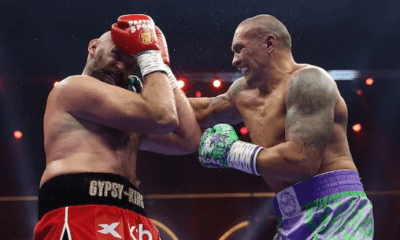
 Featured Articles2 weeks ago
Featured Articles2 weeks agoBoxing Notes and Nuggets from Thomas Hauser
-
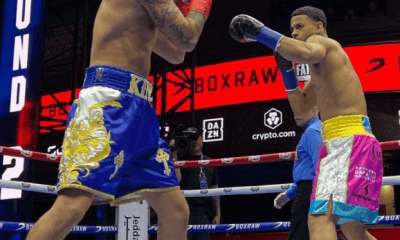
 Featured Articles4 weeks ago
Featured Articles4 weeks agoRolly Romero Upsets Ryan Garcia in the Finale of a Times Square Tripleheader
-
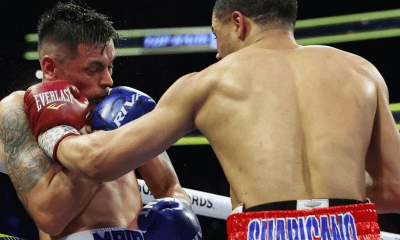
 Featured Articles4 weeks ago
Featured Articles4 weeks agoUndercard Results and Recaps from the Inoue-Cardenas Show in Las Vegas
-
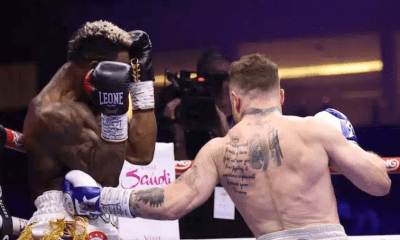
 Featured Articles4 weeks ago
Featured Articles4 weeks agoCanelo Alvarez Upends Dancing Machine William Scull in Saudi Arabia
-
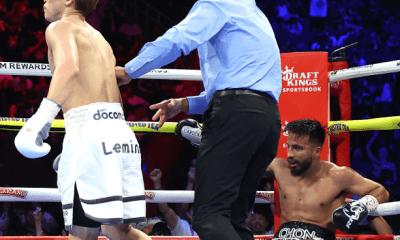
 Featured Articles4 weeks ago
Featured Articles4 weeks agoBombs Away in Las Vegas where Inoue and Espinoza Scored Smashing Triumphs
-
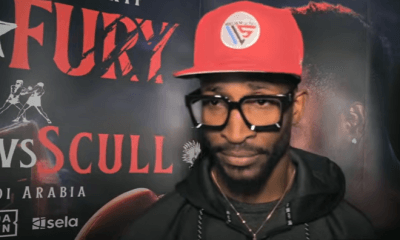
 Featured Articles4 weeks ago
Featured Articles4 weeks agoArne’s Almanac: The Good, the Bad, and the (Mostly) Ugly; a Weekend Boxing Recap and More
-
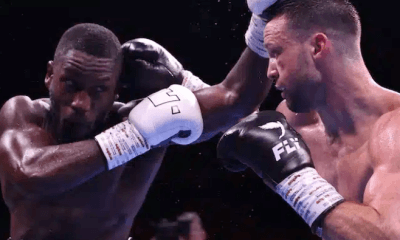
 Featured Articles1 week ago
Featured Articles1 week agoEkow Essuman Upsets Josh Taylor and Moses Itauma Blasts Out Mike Balogun in Glasgow




















1 Comment